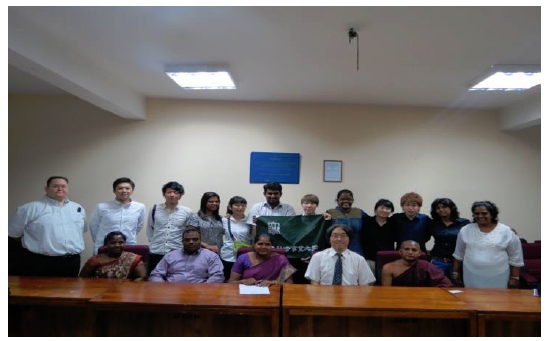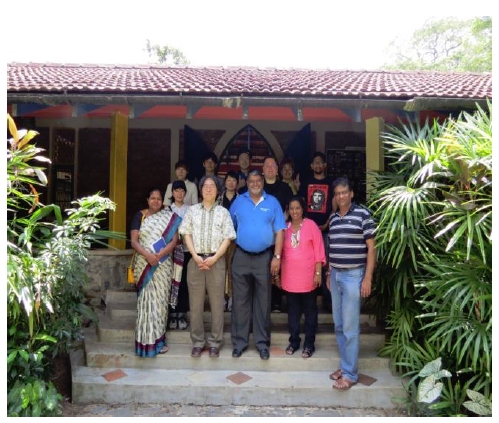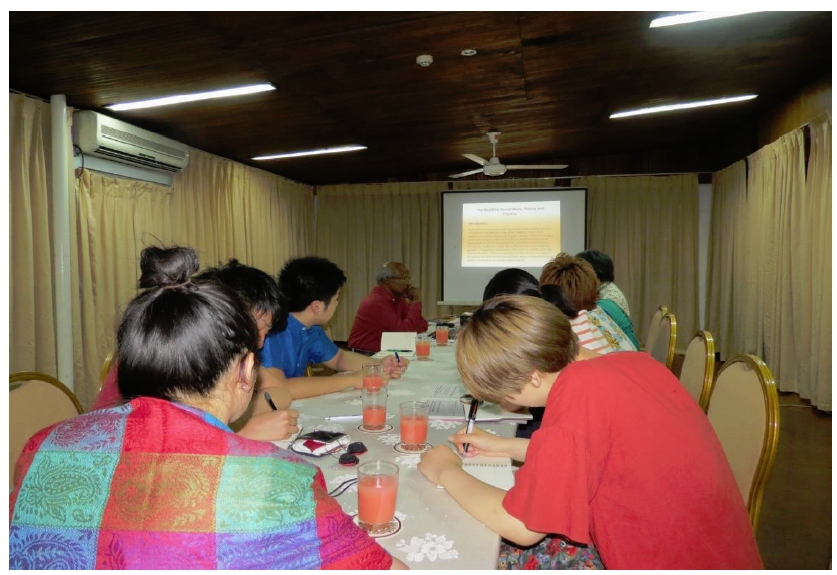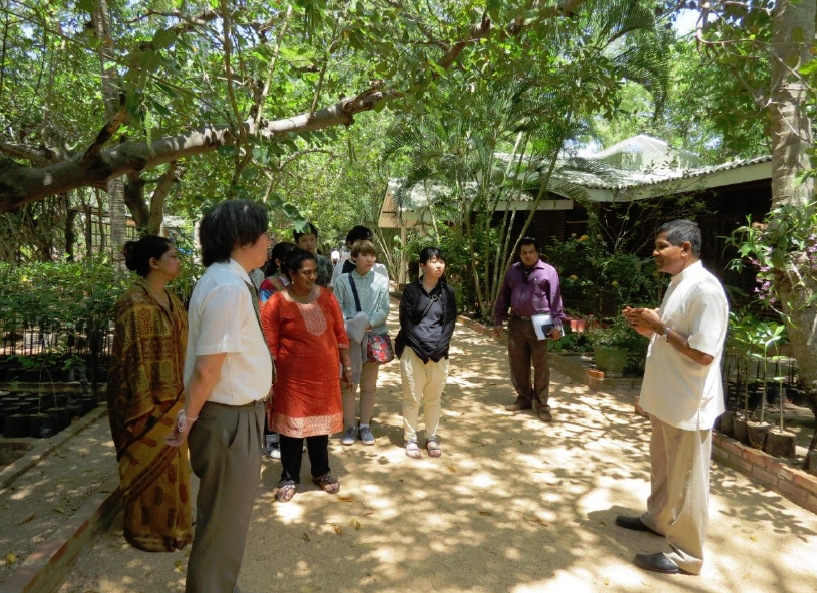CHECK IT OUT! APASWE : No.17 (2015-2017)
CHECK IT OUT! APASWE : No.17 (2015-2017)
Report from APASWE Colleagues in Japan
International Social Work Training on Poverty and Buddhism in the Asia Pacific
Inquiries by the Japan College of Social Work (JCSW) to the Profession in Sri Lanka
Takashi Fujioka (Professor, JCSW)
Viktor Virag (Research Fellow, JCSW)
It was the first time for us to visit Sri Lanka, but thanks to our kind hosts, it turned out to be a truly fruitful overseas study tour at the end of March 2016. First of all, I along with our team would like to express our deepest gratitude to our many local friends who looked after us during our stay, especially Mrs. Gowry Vasudevan of the National Institute of Social Development (NISD) for her most detailed considerations starting with planning this tour and executing it.
On the first day, the two lectures at NISD on ‘Buddhism and Social Work’ and ‘Poverty and Social Work’ were really exciting. First, we listened to Dr. Rev. Raluwe Padmasiri Thero, who is not only a renowned monk but also an academic of the topic. He told us about Theravada Buddhism and how early forms of Buddhism are still remaining. We learned that social welfare activities as such have clearly been carried out since the age of the Buddha himself. Personally, we deeply agreed with this view. Also, Rev. Omalpe Somananda Thero of NISD taught us about social work from a Buddhist monk’s perspective. We were able to understand that many things can be done in conflict resolution and resolving grievances by being a Buddhist monk, and that what it means when monks engage in social welfare activities.
We had the chance to ask about how they work together and share functions with social workers who underwent standard professional education and also about the timeline such as the initial phase and the mid-term phase of such collaborations. The answer was that there are not enough links yet, but there are plenty of opportunities in the future, so they acknowledged the possibility of the practice and/or research in the field of Buddhism and social work.
Furthermore, regarding poverty and social work, we were given the chance to tell about the situation of poverty in Japan too, so we managed to confirm many common points between both of our countries concerning this topic. Specifically, we were able to engage in active discussions about the definition and measurement of absolute and relative poverty, as well as methods of assistance.

With NISD factulty and students
During lunchtime, we were provided with a platform for interactions between NISD and JCSW students, so it became an opportunity for friendly exchanges.
On the following day, we visited the SOS Children’s Village, a facility for children. It is affiliated with an international organization that is famous in Japan too for its institutional form for child protection and operational structure. Unique to Sri Lanka, it was very educational for us in the sense that we could see how social protection is done with a global perspective. When we asked a practicing mother whether it was difficult to prepare meals and do the laundry for so many children, she replied that since she herself had grown up in a big family, it was no problem for her, for which we really admired her commitment and dedication. In addition, the expression on the children’s faces was quite lively so we are sure that each of them is made to feel important and raised in the best of health.

At the local SOS Children’s Village
Next, we managed to listen directly to care workers at the national Home for Elders, which we visited in the afternoon. They said that they gain joy from clients and that they are happy and were thankful to this job that they are able to respond in certain ways when they are dealing with their own parents. We were moved by the way how they think of their work, not only seeing the difficulties but also considering it positively.
On the second day, officials of the National Child Protection Authority told us about the situation in children’s rights abuses and we could see the difficulties Sri Lanka has in this aspect. Further on, in the afternoon we were taken to HelpAge, a support agency for older people. Here, we learned that problems related to aging in fact lead to feeling alive and dealing with these problems leads to happiness.
In the latter half of the tour, we went to Kandy where we also managed to learn about Buddhism and social work as well as green social work.
Reflecting on this tour, we managed to consider many issues. It had a very warm impact on us to get a glimpse into the deep philosophy of people who are surrounded by a wonderful natural environment and keep on smiling with kindness, even though they carry on the sad history of a bitter ethnic dispute. Of course we cannot say that we understood enough about Sri Lanka yet. I sincerely wish to visit again and engage in further exchanges with fellow colleagues. I deeply thank Mrs. Gowry and other kind Sri Lankan friends.
Reflections by JCSW students (in alphabetic order)
“I am grateful for the opportunity that I was able to participate in the exchange program with NISD. I discovered many things in the lectures that were prepared for us. These included one on ‘Buddhist Social Work’ by a monk.

Special study session on Buddhism in social work
First of all, Buddhist social work has a feature that is completely different from the social welfare activities that we usually learn. This characteristic is the notion that it is not a profession. No payment is required for services. In Japan, the fact that the salary of welfare related employees is low in comparison with the necessary workload leads to various problems such as shortage of personnel. We also learned that monks are engaged not only in solving the problems of clients, but also in improving the person’s life throughout his or her lifetime. We may need this in Japanese social welfare too.
However, we could also understand that even in Buddhist social work many dilemmas arise in social welfare activities. Additionally, I felt that the reason that Buddhist social work can actually become social welfare activity is the unique society of Sri Lanka where Buddhism is deeply rooted and present.
In the future, utilizing what I have learned in Sri Lanka, I would like to think about what kind of social work can exist with the least number of dilemmas.”
(Monshi Kayo, 2nd Grade Undergraduate Student)
“Last year, the annual Asia-Pacific Social Welfare Seminar was held at our college and it included a discussion about Buddhism and social work. At that time, I got interested in Buddhism and social work. Hence, since the topic of this year’s study tour was ‘Issues of Poverty and Buddhism in Social Work’, I decided to participate.
As for my faith, I visit a temple only once a year in the New Year season, so I felt overwhelmed by the sheer number and liveliness of people going to Sri Lankan temples. At my New Year visits, I pay my offerings and respect, by a fortune scroll and an amulet and go home. In Sri Lanka, no such money transaction is involved, so I learned that ways of worship are different in countries even when they are similarly Buddhist. This was a great opportunity to rethink my beliefs.
From April, I am scheduled to engage in research on child abuse at our graduate school. I had a very favorable impression when we visited facilities and agencies related to children and we could see that in Sri Lanka human rights are a priority, although I wish we had more time and could learn more on the topic.”
(Yuki Mita, 4th Grade Undergraduate Student)
“This one week training in Sri Lanka was the first overseas experience in my life. In the past, I have heard several times about the differences between Japan and other countries. However, they were only second hand information, now I understood that they are nothing in comparison with seeing it with my own eyes. A great difference with Japan that I felt was that several ethnic groups mix in one country, they all believe in different religions and have their distinct ways of life. Of course there are other ethnicities in Japan too, but as of now they are really all ethnic minorities, so here there are much less opportunities to recognize different ethnicities when compared to Sri Lanka. Also, Japan is said to be a uniquely non-religious country in the world where religion is not rooted in life. This difference provided me with a chance to seriously think about which way of life is happier. However, I came to the conclusion that there cannot be an answer to that, since every country has its own specific culture and ‘happiness’ that people seek also differs. Rather than thinking of which is happier, I felt that what is important is the diversity of the concept of happiness and the willingness to accept all these versions.”
(Akira Miyashita, 2nd Grade Undergraduate Student)
“We were blessed with the chance to learn for one week in Sri Lanka, a beautiful country rich in greenery.
For me, it was impressive that Buddhism is strongly linked with welfare. As someone who does not belong to any specific religion, I was amazed at the power of religion when I learned that social work practice itself is a direct embodiment of Buddhist teachings. In Japan, there are many social workers who quit their job because it is difficult for them to keep up their own motivation. In this sense, I felt that Buddhist social workers have a certain strength, since for them it is important to gain virtue without desire even if they continue to suffer.
Finally, I would like to sincerely thank everybody in Sri Lanka who helped with this study tour and kindly taught us so much. I truly hope for an even brighter future for Sri Lanka.”
(Keiko Munakata, 3rd Grade Undergraduate Student)
“During this training, I was given the chance to interact with many people from Sri Lanka and see various fields of welfare practice, so these became extremely valuable experiences for me. Through these, I think I could observe the best of Sri Lanka.
In Sri Lanka, religion is considered important and welfare activities are carried out based on these values. I felt that it is a very good thing that religion is important to people and it is linked to social work itself.
Also, people are cheerful, the country is blessed with natural resources and the food is excellent. These are all necessary factors for life and they also provide vitality for living. That is why Sri Lanka is full of power to live, energy, which I also consider a good side of the country.
Unfortunately, many issues still remain, for instance public hygiene. If social work practice can overcome such issues, Sri Lanka will surely become an even more energetic and rich country.”
(Taiga Ochi, 4th Grade Undergraduate Student)
“Going to Sri Lanka, I felt that various aspects are different from Japan. Food, townscapes, history etc.: there is no end to it if I try to list them all. Welfare is not an exemption either; I learned that the teachings of Buddhism are the backbone of social work practice in Sri Lanka. Many Japanese people do not live according to Buddhist teachings, so it felt very new to learn about such matters.
When preparing for the study tour, we had engaged in pre-departure study sessions to learn various things about Sri Lanka, but there were many things that could not have been understood without actually going there. During this study tour, we visited numerous welfare facilities and agencies and I think we could not find what we have been kindly taught on the internet no matter how hard we searched for it. Also, we managed to learn about Sri Lanka through sightseeing sessions too. I think that by knowing about Sri Lanka, we managed to reflect on Japan too.”
(Fuka Ota, 3rd Grade Undergraduate Student)
Observations to social work in a religion centered society (by Viktor Virag)
First of all, I would like to thank our Sri Lankan counterpart organizations, the National Institute of Social Development (NISD) and the Small Fishers Federation, especially Mrs. Varathagowry Vasudevan and Mr. Anuradha Wickramasinghe for coordinating this wonderful training trip for us in and around Colombo, Kandy,
Chilaw and on the way between these cities.
From my point of view, there are three aspects of social welfare practice, education and research in Sri Lanka that are of particular interest to observers from Japan.
The first aspect is related to cultural diversity in Sri Lankan society. As some JCSW students have also noted in their reflections, this level of integration is rarely experienced in Japan, a rather monocultural state. What is even more interesting is the complexity of this diversity producing a multi-ethnic, multi-religious, and multi-lingual society. Simultaneously, the three components of ethnicity, religion, and language are intertwining in a peculiar way with two major (Sinhalese and Tamils) and many smaller (Burghers, Malays, Moors etc.) ethnic groups, four major religions (Buddhists, Hindus, various Christian denominations, and Islam), and three main languages in use (Sinhala, Tamil, English). Practitioners providing social services, educators engaged in social worker training, and academics conducting welfare related research have to be and actually are aware of this unique composition of the Sri Lankan population and must respond to it while carrying out their work. Of course the abuse and exploitation of this diversity by Western colonizers, domestic politicians, and ideological extremists resulted in a bitter civil war that lasted for almost three decades, however now that the country has overcome this sad history, one can literally feel the respect and tolerance for other groups in the air even though some grievances and the devastating legacy of this period still remains in form of various social problems.
The second aspect Japanese social work has a lot to learn from is the overall relative independence of the Sri Lankan profession from government and public administration. Although free healthcare and free education is universal in the country, there seems to be a general mistrust against government funded public services. This is probably due to historical reasons and frequent changes in policy. On the other hand, this provides enormous confidence and initiative power to the private sector. Rather than waiting for tax allocation and the legal system to catch up with social needs, non-governmental organizations, including religious ones, independently raise funds and develop their own service delivery principles and systems. These pioneering social work activities open up their own frontiers, not often seen in the government led Japanese welfare state. Given their flexibility, some agencies even seem to dare to operate in a legal gray zone when necessary while advocating for necessary legislation and openly negotiating with the government. One good example of this proactive mentality is the explicit statement of organizational visions and missions. We have seen this wherever we went including residential and non-residential service agencies, institutions of higher education, and probably learning from the private sector, government offices as well. This is a most basic requirement upon providing a good service, yet unfortunately it is often missing in the highly systemized welfare system in Japan where many providers are mandated by law and only act accordingly without developing their own vision. This is a crucial point that should be studied by the Japanese profession.
Last but not least, the third aspect that was most relevant to participants has to do with one of the main topics of the training itself: ‘Buddhism in Social Work’. In fact, we had the opportunity to study the topic before departure in various forms, including lectures, seminars and project reports, but it was not until we actually had the chance to visit Sri Lanka with its quite socially active temples and monasteries, and listened to detailed lectures by true experts on the subject from the University of Kelaniya, NISD and the University of Peradeniya followed by heated discussions. Definitely, these sessions were the crown jewel on the one week training for us, and thankfully it is safe to say that we managed to get an overall picture of what one means when mentions social work rooted in ‘non-Western’ value systems. Obviously, we have just only begun to scratch the surface and grasp the concept, but I personally felt that a non human centered worldview (as opposed to Judeo-Christian and Islamic cultural traditions, where ‘man’ is the core of creation) is something we are desperately in need of in the world of today threatened by global environmental problems. This way of thinking can directly be linked to the idea of ‘green social work’, something what we could actually seen in practice in form of a nationwide mangrove conservation initiative
combined with community based projects.

Learning about sustainable community development
Finally, we are truly grateful to our most enthusiastic guide Mr. Sarath Liyanagoda and our kind interpreter Mrs. Kamani Thushita Samarakone for leading us through the country and for their highly respected integrity with which they responded to our rather delicate inquiries regarding such matters as ethnicity, religion, and the war.
- Hits: 2696


